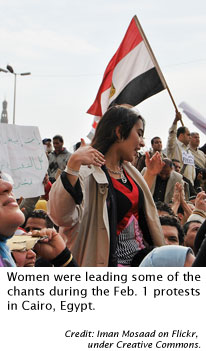|
 By Dominique Soguel By Dominique Soguel
Thursday, February 3, 2011
Women who have been joining the Egyptian protests to oust Mubarak
minimize the risk that the Islamist Muslim Brotherhood could dominate a future
government. If the revolution succeeds, they look forward to playing a part in
the transition.
(WOMENSENEWS)--For Egyptian women in the March of a Million
and other street protests to oust authoritarian President Hosni Mubarak, the
sometimes deadly demonstrations have been a show of force.
"Women are key actors in this historical moment of Egypt," Mozn Hassan,
executive director of the Cairo-based Nazra for Feminist Studies, wrote Women's
eNews at 5 p.m. on Feb. 2, moments after the Egyptian army fired warning shots
in Cairo in a bid to break up violent clashes. "Women are giving a statement
that they are working closely with men to change Egypt."
Azza Soliman, at the Center for Egyptian Women Legal Assistance, is one of
many activists underscoring the interreligious and national character of Egypt's
unrelenting pro-democracy rallies.
"I want you to know that during the past demonstrations not once has there
been an Islamic slogan," she said in a Feb. 2 email. "None of the opposition
leaders would attribute this revolution to himself as we witness a popular
uprising by the youth of Egypt, which are regular citizens oppressed by
Mubarak's regime for 30 years."
Soliman added the movement's leadership is aware and confident in putting
together a national coalition to reform the Egyptian constitution and uphold the
principles of citizenship and establish a civil state in Egypt.
Women's stance at Tahrir (Liberation) Square in central Cairo and their
presence in protests across the country is also making an online splash. Women
of Egypt, a Facebook group, created a photo gallery to document women's role at
the historic hour.
The call for democracy not only crossed gender lines, it is also changing
street conduct. Nazra for Feminist Studies' Hassan highlighted that women had
been able to protest freely without men to protect them and without confronting
the usual sexual harassment rampant on Cairo's streets.
"Egyptians citizens gave a message of civility," she said. "During all the
last days, no single sexual harassment incident occurred and people were aware
of that."
On Feb. 1 women were widely visible on TV; donning sunglasses, hijabs and
burkas, wardrobes that mirror the colorful fabric of Egyptian society. Mothers
betting on the movement's success brought their daughters out to the streets
hoping to witness the coming dawn of democracy.
While the protests have at times turned dangerous and deadly, the unified
stance taken by men and women brought a sense of relief to Hibaaq Osman, founder
and CEO of Karama (Dignity), a coalition of partners building a movement to end
violence against women in the Middle East and North Africa.
In a blog post early on Feb. 2, she wrote proudly about the high turn out of
women in the previous day's demonstration.
"Amidst the chaos…we have seen people of all backgrounds, religions, and
occupations come together. But more than this, we have watched as men and women
dissolved the gender barrier that has long been held between them." |

